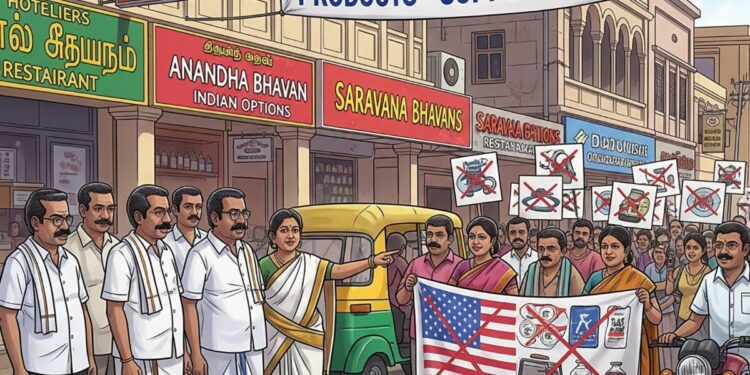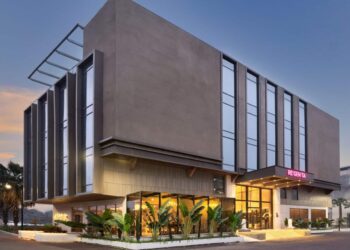-Khwaish Hingad (cbedit@imaws.org)
The Tamil Nadu Hotel Owners Association has announced a comprehensive statewide boycott of American food and beverage products, marking a decisive response to the 50% tariffs imposed by the United States on Indian exports. The boycott, effective immediately, affects approximately 100,000 hotels and restaurants across the state and represents one of the most significant industry-led protests against US trade policies.
Strategic Response to Punitive US Tariffs
The boycott directly responds to the Trump administration’s escalating trade war against India. Starting August 27, 2025, the United States implemented a devastating 50% tariff rate on Indian exports, doubling the previous 25% rate imposed on August 7. These tariffs were specifically designed to punish India for its continued purchases of Russian oil and defense equipment, with the US citing national security concerns under Section 232 of the Trade Expansion Act of 1962.
Venkadasubbu, President of the Tamil Nadu Hotel Owners Association, justified the boycott by emphasizing the unfairness of the trade environment and the heavy burden carried by India’s farmers and workers in comparison to US gains.

“As a first step, we are trying this on a trial basis in Tamil Nadu, because we want to see how our people respond with the same emotion and intention. All our hotel owners are united in this effort. The U.S. is levying nearly 50% tax on products that are born from the sweat and suffering of our farmers and workers; cotton from our agriculturists, textiles from our mills, and leather from our tanneries. After enduring pests, rains, hard labor, pollution, and even dyeing processes that damage our environment, we prepare quality products and send them to the U.S., only for them to tax us heavily. The same story applies to Pepsi and Coke, which take water from our land, sell it back to us in plastic bottles, and add unhealthy chemicals.
This is why we feel it is time to eliminate such dependence. By supporting alternatives like Parle and Campa Cola, which we are now negotiating with, we can provide high-quality products to customers at better prices, while ensuring better profits for our hotel owners. This step shows that we are not weak, as some may think, but capable of standing up for our people and our farmers.”
Comprehensive Scope of the Boycott
The boycott extends beyond soft drinks, targeting a broad range of American products and services. Coca-Cola, Pepsi, KFC, and mineral water produced by US companies are set to be eliminated from Tamil Nadu’s hospitality sector. In addition, the association has decided to abandon popular food delivery platforms Swiggy and Zomato, instead promoting a Tamil Nadu–based homegrown alternative called Zaaroz.
Association President Venkadasubbu confirmed that the enforcement has started, and the association also plans to mobilize its network of members across Tamil Nadu before taking the campaign to a national level.
Promoting Indian Alternatives
The boycott strategy actively encourages Indian beverage brands to replace American products. Traditional Indian soft drinks like Campa Cola and Bovonto are positioned as healthier and more locally rooted alternatives. Bovonto, produced by the century-old Kali Aerated Water Works, has been a household name in Tamil Nadu for generations, while Campa Cola represents a legacy brand from the 1970s that originally rose to prominence after Coca-Cola’s exit from India due to regulatory restrictions.
Venkadasubbu reiterated the importance of building consumer confidence in local choices: “Even better products are available here, even healthier products are available here. There are so many competitors with equally good quality products available in India. We want to encourage them.”

The Alternative Platform
A significant feature of the boycott focuses on transitioning to the Zaaroz app, a Tamil Nadu-based food delivery platform. Already successful in pilot markets such as Cuddalore and Namakkal, Zaaroz offers services to nearly 5,000 vendors and over 8 lakh customers. Unlike Swiggy and Zomato, which charge restaurants between ₹20,000 to ₹30,000 per month in commissions, Zaaroz follows a subscription model that costs ₹3,000 per restaurant and ₹1,500 for smaller establishments like bakeries. This drastically reduces costs for local businesses—up to 90% savings—allowing restaurateurs to serve food at fairer prices.
Historical Context and Industry Impact
This boycott follows earlier challenges against global beverage companies in Tamil Nadu. In 2016, Coca-Cola and PepsiCo were barred from using water from the Thamirabarani River amid protests by farmers. Though that campaign was short-lived, the current boycott has a stronger foundation due to its direct link with retaliatory US tariffs affecting India’s $48.2 billion annual exports. Labor-intensive sectors such as textiles, gems and jewelry, leather goods, and food processing face some of the gravest risks, with combined tariff rates exceeding 60% for certain products.
With its 100,000-member establishments serving 70 million people in Tamil Nadu, the Hotel Owners Association wields considerable influence over regional consumption trends, ensuring the boycott will carry significant weight in South India.
Economic and Political Implications
The boycott reflects the wider frustration in India over trade restrictions imposed by Washington. Finance Minister Nirmala Sitharaman has already warned that these tariffs could reduce India’s GDP by up to 0.6% this year. By aligning itself with the “Make in India” vision, the Tamil Nadu Hotel Owners Association presents its campaign not only as a stance against unfair trade practices but also as a proactive step toward domestic self-reliance. If successful, this initiative could inspire similar actions across India, potentially escalating the trade standoff while boosting Indian brands’ resilience in the global marketplace.







